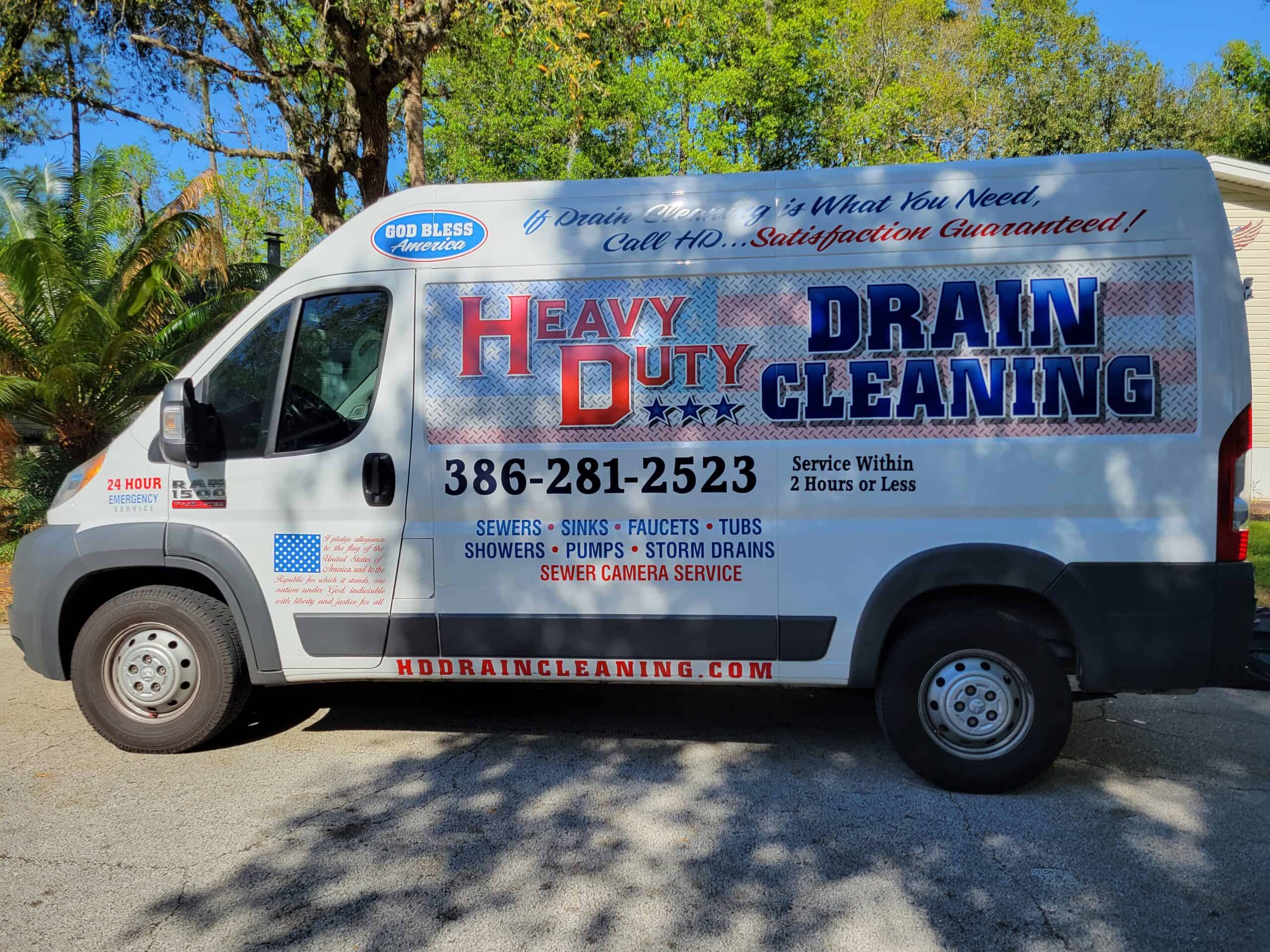Cold weather can wreak havoc on your plumbing. This is especially true when temperatures drop unexpectedly. One of the most common plumbing issues in colder months is frozen pipes. If left untreated, frozen pipes can burst, causing extensive water damage and costly repairs. As your local Palm Coast plumber, HD Drain Cleaning can help. We will advise you on what to do if your pipes freeze and how to prevent it in the future.
This article will guide you in safely handling frozen pipes. It will cover how to thaw them and how to prevent future issues.
Why do pipes freeze?
Understanding the Freezing Process
When temperatures fall below freezing, the water inside your pipes can begin to freeze. As the water turns to ice, it expands, creating pressure within the pipe. If the pressure becomes too high, it can cause the pipe to crack or burst, leading to flooding and water damage.
Factors That Contribute to Frozen Pipes:
-
Exposed Pipes: Pipes in unheated areas, like attics, garages, or outdoors, are especially vulnerable.
-
Sudden Cold Snaps: In warmer areas like Palm Coast, a sudden cold snap can catch homeowners off guard and freeze their pipes.
-
Poor insulation: Insufficient insulation around your pipes exposes them to cold air. This increases the risk of freezing.
What to Do When Your Pipes Freeze
Step 1: Locate the frozen pipe.
The first step in addressing frozen pipes is to locate the affected area. Common signs that a pipe has frozen include:
-
No water flow: If water stops coming out of your faucet, it may indicate a frozen pipe.
-
Visible Frost: You might see frost or ice on the outside of the pipe.
-
Bulging pipes: A frozen pipe can expand and bulge; a clear sign that ice is inside.
How to Identify Frozen Pipes:
-
Check exposed pipes in attics, basements, or crawl spaces.
-
Feel for cold spots along the pipes.
-
Look at outdoor plumbing systems, such as garden hoses or sprinkler lines.
Step 2: Turn off the water supply.
If you suspect a pipe is frozen, immediately turn off the water supply to prevent pressure from building up and causing a burst pipe. This step is crucial for minimizing potential water damage.
How to Shut Off Your Water:
-
Locate your home’s main water valve, typically found near the water meter or where the main water line enters your home.
-
Turn off the valve by rotating it clockwise.
-
Open your faucets to release any remaining water and reduce the pressure in the pipes.
Step 3: Thaw the frozen pipe.
Once you’ve turned off the water supply, it’s time to thaw the frozen pipe. There are several safe methods for doing this without damaging your plumbing.
Safe Ways to Thaw a Frozen Pipe:
-
Use a Hair Dryer: One of the easiest ways to thaw a frozen pipe is by applying heat with a hair dryer. Start at the faucet end and move towards the frozen section of the pipe. Be sure to keep the hair dryer moving to avoid overheating any one spot.
-
Space Heaters or Heating Pads: For larger frozen sections, you can use a space heater or heating pad to slowly warm the area. This method works well for pipes located in crawl spaces or basements.
-
Hot Towels: Soak towels in hot water and wrap them around the frozen pipe. The heat will gradually transfer to the pipe, helping to thaw the ice.
What to Avoid:
-
Do not use open flames: Using a blowtorch or other open flame to thaw pipes can cause more harm than good, including damaging the pipe or starting a fire.
-
Do not leave thawing pipes unattended: Always monitor the thawing process to ensure it’s proceeding safely.
Step 4: Check for leaks
Once the pipe is thawed, carefully check for any signs of cracks or leaks. A frozen pipe may not burst immediately, but cracks can develop as the ice melts. If you notice any damage, contact your Palm Coast plumber right away to have the pipe repaired.
Preventing Frozen Pipes
Preventing pipes from freezing in the first place is the best way to avoid costly repairs and water damage. Here are several steps you can take to protect your plumbing system from freezing.
Insulate your pipes.
Proper insulation is one of the most effective ways to prevent your pipes from freezing. Pipes in unheated areas, like attics and basements, are prone to freezing. They should be insulated.
Tips for Pipe Insulation:
-
Use foam pipe insulation to cover exposed pipes.
-
Apply heat tape or heat cables to pipes in particularly cold areas.
-
Insulate the pipes running along exterior walls.
Keep Your Home Warm
Even if you’re leaving your home for an extended period, it’s important to keep the thermostat set to at least 55°F (12°C). This ensures that your pipes remain warm enough to avoid freezing.
Additional Heating Tips:
-
Open cabinet doors under sinks to allow warm air to circulate around the pipes.
-
Close garage doors to keep cold air out if the water supply lines run through the garage.
-
Use space heaters in unheated areas to prevent freezing.
Disconnect outdoor hoses.
Before cold weather sets in, be sure to disconnect and drain any outdoor hoses or sprinkler systems. Water left in these pipes can freeze and cause the pipes to burst.
Outdoor Plumbing Winterization:
-
Shut off the water supply to the outdoor faucets.
-
Drain any remaining water from the pipes.
-
Install outdoor faucet covers to protect exposed plumbing.
When to Call a Palm Coast Plumber
If your efforts to thaw a frozen pipe are unsuccessful or if you discover a burst pipe, it’s important to call a Palm Coast plumber immediately. At HD Drain Cleaning, we provide fast, reliable service for emergencies, like frozen and burst pipes.
Why Call a Professional:
-
Expertise: A plumber has the tools and experience to safely thaw pipes. They can do this without causing further damage.
-
Preventive Care: We can fix the issue. We can also prevent future frozen pipes with insulation and winterization techniques.
-
Emergency Service: We provide emergency plumbing for urgent issues, such as burst pipes or leaks.
Long-Term Protection Against Frozen Pipes
Protecting your pipes from freezing should be part of your regular home maintenance routine. By following the tips in this article and a trusted Palm Coast plumber, you can reduce the risk of frozen pipes. This will keep your plumbing in top shape year-round. Final Tips for Winterizing Your Plumbing:
-
Insulate all exposed pipes.
-
Keep your home warm, even when you’re away.
-
Disconnect outdoor plumbing systems.
-
Perform regular maintenance checks on your plumbing system, especially in winter.
Conclusion: Don’t let frozen pipes catch you off guard
Frozen pipes can lead to significant water damage if not handled correctly. By taking immediate action and following the steps in this guide, you can safely thaw frozen pipes and prevent future issues. For expert plumbing help, contact HD Drain Cleaning. They are a reliable Palm Coast plumber. They can handle all your emergency and preventive plumbing needs.

